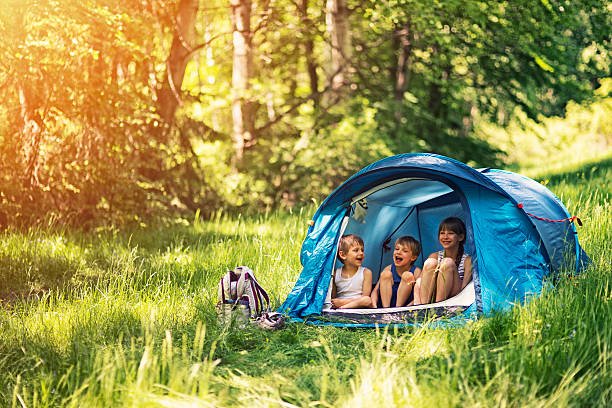Camping with kids is an excellent way to introduce young ones to the wonders of nature, foster a sense of adventure, and create lasting family memories. However, planning and executing a successful camping trip with children requires careful consideration and preparation. This comprehensive guide will explore the joys and challenges of kids camping, offering valuable insights, tips, and strategies to ensure a fun and safe outdoor experience for the whole family.
The Benefits of Kids Camping
Connecting with Nature
One of the primary advantages of kids camping is the opportunity for children to connect with nature in a meaningful way. In today’s technology-driven world, many children spend a significant amount of time indoors, glued to screens. Camping provides a much-needed break from digital devices and allows kids to explore the natural world around them. From observing wildlife to learning about different plants and ecosystems, camping offers countless opportunities for hands-on learning and discovery.
Developing Life Skills
Camping is an excellent way to help children develop essential life skills. From setting up a tent to building a campfire, kids learn valuable lessons in problem-solving, teamwork, and self-reliance. These experiences can boost their confidence and independence, skills that will serve them well throughout their lives. Additionally, camping teaches children about environmental stewardship and the importance of preserving nature for future generations.
Strengthening Family Bonds
Camping provides a unique opportunity for families to spend quality time together away from the distractions of everyday life. Without the usual routines and responsibilities, families can focus on bonding through shared experiences and adventures. Whether it’s telling stories around the campfire, working together to prepare meals, or exploring hiking trails, camping creates lasting memories and strengthens family relationships.
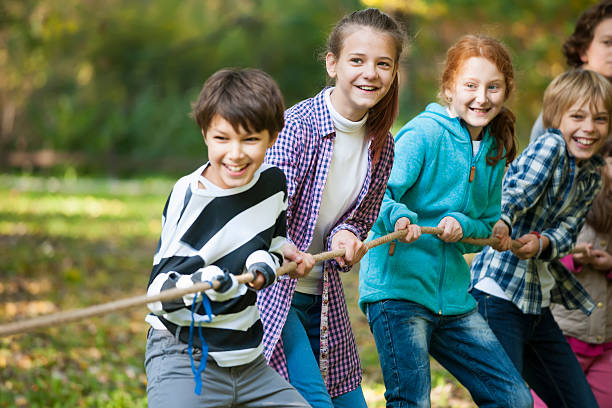
Planning Your Kids Camping Trip
Choosing the Right Campsite
When planning a camping trip with kids, selecting an appropriate campsite is crucial. Consider the following factors:
- Amenities: Look for campgrounds with facilities suitable for families, such as clean restrooms, showers, and potable water sources.
- Activities: Choose a location that offers a variety of kid-friendly activities, such as hiking trails, fishing spots, or swimming areas.
- Terrain: Opt for relatively flat terrain that’s easy for children to navigate.
- Safety: Research the area for potential hazards and ensure the campsite has proper safety measures in place.
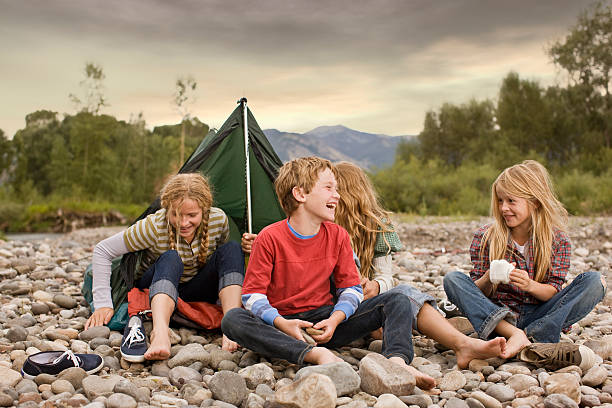
Essential Gear for Kids Camping
Packing the right gear is essential for a successful camping trip with children. Here’s a list of must-have items:
- Family-sized tent
- Sleeping bags and sleeping pads
- Camping chairs and table
- Cooking equipment (stove, pots, utensils)
- First aid kit
- Flashlights or headlamps
- Weather-appropriate clothing
- Sun protection (hats, sunscreen)
- Insect repellent
- Entertainment items (games, books, toys)

Meal Planning for Kids Camping
Proper nutrition is crucial when camping with kids. Plan meals that are easy to prepare, nutritious, and appealing to young palates. Consider the following tips:
- Pack non-perishable snacks for energy boosts throughout the day.
- Prepare some meals in advance to save time at the campsite.
- Involve kids in meal planning and preparation to make it a fun learning experience.
- Bring familiar foods to provide comfort in an unfamiliar environment.
- Don’t forget treats for special moments, like s’mores around the campfire.
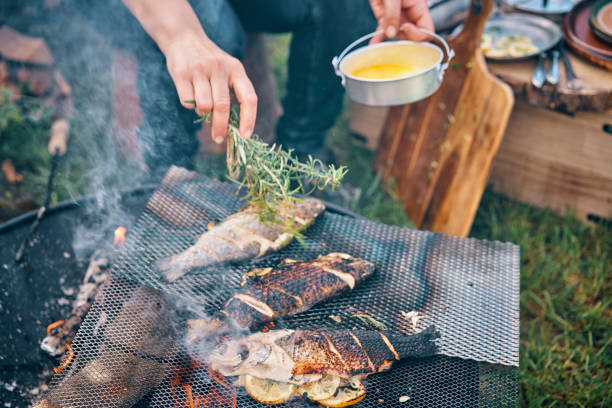
Kids Camping Activities
Nature Exploration and Education
Camping provides an excellent opportunity to teach children about nature and the environment. Consider the following activities:
- Nature scavenger hunts
- Bird watching and animal tracking
- Plant identification
- Star gazing and astronomy lessons
- Creating nature journals or sketching wildlife

Outdoor Skills and Survival Techniques
Introduce children to basic outdoor skills and survival techniques in a fun and age-appropriate manner:
- Setting up a tent
- Building a safe campfire
- Basic knot tying
- Compass and map reading
- Leave No Trace principles
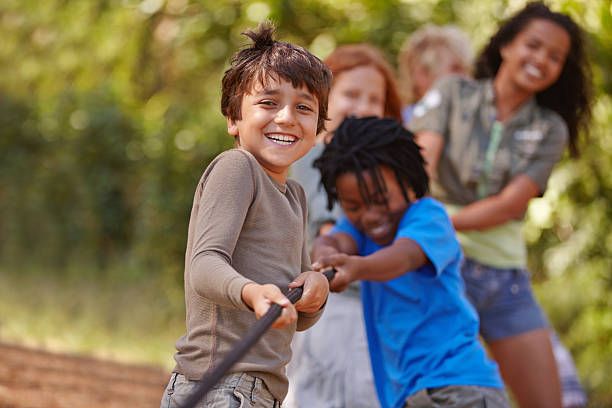
Fun and Games
Incorporate plenty of fun activities to keep kids engaged and entertained:
- Campfire stories and sing-alongs
- Outdoor games (frisbee, catch, tag)
- Arts and crafts using natural materials
- Treasure hunts or geocaching
- Water activities (if near a lake or stream)

Safety Considerations for Kids Camping
First Aid and Emergency Preparedness
Ensuring the safety of children during a camping trip is paramount. Consider the following safety measures:
- Pack a comprehensive first aid kit and know how to use it.
- Familiarize yourself with the nearest medical facilities.
- Teach children basic first aid and what to do in case of an emergency.
- Establish clear boundaries and rules for exploring the campsite.
- Bring a whistle for each child to use in case they get lost.
Wildlife Awareness
Educate children about local wildlife and how to stay safe:
- Teach kids to observe animals from a safe distance.
- Store food properly to avoid attracting wildlife to the campsite.
- Explain what to do if they encounter potentially dangerous animals.
- Encourage respect for wildlife and their habitats.
Weather Preparedness
Be prepared for various weather conditions:
- Check weather forecasts before and during the trip.
- Pack appropriate clothing for all potential weather scenarios.
- Know how to recognize signs of heat exhaustion or hypothermia.
- Have a plan for severe weather, including where to seek shelter.

Tips for a Successful Kids Camping Experience
Involve Kids in Planning and Preparation
Getting children involved in the planning process can increase their excitement and engagement:
- Let kids help choose the campsite and activities.
- Assign age-appropriate tasks for packing and setup.
- Encourage children to research the area and local wildlife.
- Discuss expectations and establish ground rules together.
Start Small and Build Up
For families new to camping, it’s best to start with shorter trips and gradually work up to longer adventures:
- Begin with backyard camping to familiarize kids with sleeping outdoors.
- Progress to overnight trips at nearby campgrounds.
- Gradually increase trip duration and distance from home.
- Consider car camping before attempting more remote backcountry experiences.
Maintain Flexibility and Patience
Camping with kids requires adaptability and a positive attitude:
- Be prepared to adjust plans based on children’s needs and interests.
- Allow for plenty of downtime and rest periods.
- Embrace unexpected moments and turn challenges into learning opportunities.
- Maintain a sense of humor and focus on creating positive memories.
FAQs (Frequently Asked Questions)
Q: What’s the best age to start camping with kids?
A: There’s no definitive “best” age, as it depends on the individual child and family. Many families start with backyard camping when children are toddlers and gradually progress to more adventurous trips as they grow older.
Q: How do I keep my kids warm while camping?
A: Dress children in layers, provide appropriate sleeping bags, use insulating sleeping pads, and ensure they stay dry. Consider bringing extra blankets and warm hats for added warmth at night.
Q: What should I do if my child is scared of the dark or sleeping outdoors?
A: Bring familiar comfort items from home, use nightlights or glow sticks, and establish comforting bedtime routines. Gradually expose children to nighttime outdoor experiences, starting with backyard camping.
Q: How can I keep kids entertained during rainy weather while camping?
A: Pack indoor activities like board games, cards, and books. Bring rain gear for outdoor exploration, and consider setting up a tarp or shelter for covered outdoor activities.
Q: What’s the best way to teach kids about camping safety?
A: Make safety education fun and interactive. Use games, role-playing, and hands-on demonstrations to teach important safety concepts. Reinforce these lessons throughout the trip.
Q: How do I handle picky eaters while camping?
A: Involve children in meal planning and preparation, bring familiar foods, and offer a variety of options. Consider allowing special treats as motivation for trying new camp foods.
Q: What should I do if my child gets homesick while camping?
A: Acknowledge their feelings, provide comfort, and engage them in fun activities. Bring familiar items from home and maintain some routines to create a sense of normalcy.
Q: How can I make camping more eco-friendly with kids?
A: Teach and practice Leave No Trace principles, use reusable gear and utensils, minimize waste, and engage children in conservation activities like trash clean-ups or nature preservation projects.
Final Words
Camping with kids is a rewarding experience that offers countless benefits for both children and parents. By carefully planning, prioritizing safety, and embracing the spirit of adventure, families can create lasting memories and foster a lifelong love for the outdoors. Remember to start small, involve children in the process, and maintain flexibility as you embark on your camping journey. With patience, creativity, and a positive attitude, kids camping can become a cherished family tradition that strengthens bonds and creates a deep appreciation for nature. So pack your gear, gather your little ones, and set out on an unforgettable adventure in the great outdoors – the memories you create will last a lifetime.
